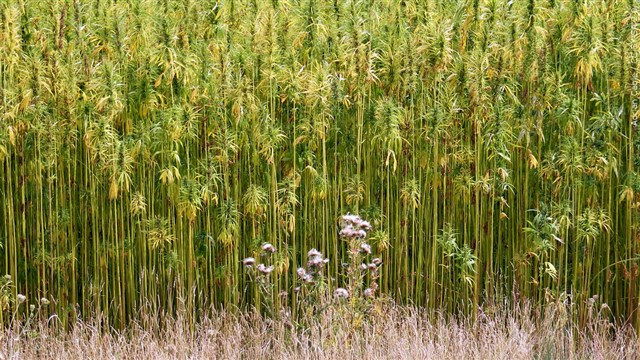OLCC, Dept. of Agriculture to begin hemp field inspections to confirm THC levels are legal

If THC levels too high, crops could be destroyed; new state law also targets illegal cannabis production
PORTLAND, Ore. (KTVZ) -- At a special meeting on Monday, the Oregon Liquor Control Commission approved temporary rules allowing the agency to work with the Oregon Department of Agriculture to begin field testing of hemp fields across Oregon; these tests are to determine if the grows are legitimate or illegal.
The OLCC rules follow Monday’s signing by Gov. Kate Brown of House Bill 3000, which also establishes standards to prevent minors from purchasing intoxicating products derived from hemp.
The OLCC temporary rules establish a limit on the level of THC (the intoxicating ingredient in marijuana) that can be in a hemp-derived product. In addition, it creates methods for testing hemp in the field to distinguish between true hemp and marijuana.
This week, starting in southern Oregon, OLCC and ODA will begin to inspect registered hemp grow sites equipped with THC field testing units. “Our objective through the remainder of the summer and into the fall is to make sure that every field gets these tests done,” said OLCC Executive Director Steve Marks.
BTW, the agency also announced this week that its "evolving mission is reflected in a law changing the agency’s name to the Oregon Liquor & Cannabis Commission, effective August 2."
There are four main components to HB 3000:
- Regulating cannabis intoxicants
- Curbing illegal production of cannabis
- State program compliance with the 2018 Farm Bill
- Establishing a task force to address the regulation and marketing of growing cannabis in Oregon
Under the new law, sales of adult-use cannabis items to minors are immediately prohibited. Previously a form of THC, Delta-8-THC, could be produced from hemp and used to make products with higher potency levels than marijuana. However, Delta-8-THC was being sold outside Oregon’s regulated market and could be found at neighborhood convenience stores, where children could buy it.
In January of 2022, the OLCC, ODA, and the Oregon Health Authority will set new potency and concentration limits for THC and other cannabis intoxicants in hemp products intended for sale to adults.
The legislation requires establishing tracking requirements for cannabinoid hemp commodities and products intended for human consumption, similar to tracking cannabis products sold in the OLCC regulated recreational or adult-use market.
HB 3000 gives OLCC and ODA tools to target illicit production of hemp, specifically around cannabis being illegally produced because it is unregistered or under the guise that it’s hemp.
OLCC inspectors will support ODA’s staff, with law enforcement providing necessary protection and safety assessments to the joint inspection teams. Together, the agencies will inspect hemp grow sites to test the crop’s THC levels to determine compliance with Oregon’s Hemp Program and, if necessary, take enforcement action, which could include crop destruction.
The law amends Oregon’s hemp laws to align with state statues, 2018 Farm Bill requirements and the US Department of Agriculture’s final rules. Oregon will submit a State Plan to USDA demonstrating key compliance measures, including the authority for criminal records checks and allowing license denials based on a hemp registration applicant’s criminal record.
OLCC and ODA staff will brief southern Oregon elected officials on the inspection plans later this week as inspectors get ready to fan out across Jackson and Josephine counties. However, OLCC Executive Director Marks indicated that legitimate hemp farmers should have no concerns.
“We’re really not trying to define what hemp is here: we’re really trying to spot check and take a minimum amount of samples to figure out what is commercial marijuana,” said Marks. “This will enable ODA or law enforcement to stop the illegal production of marijuana disguised as hemp production.”
The OLCC temporary rules remain in effect until January 1, 2022, when additional other legislative requirements of HB 3000 go into effect.